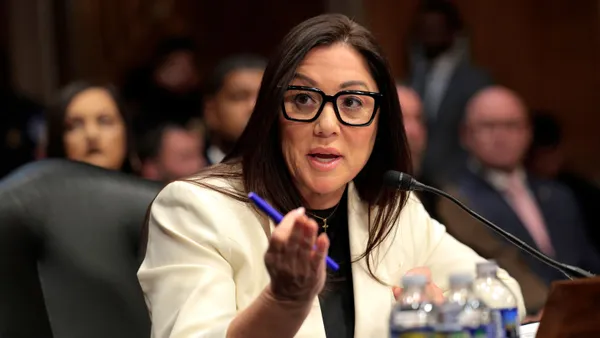Dive Brief:
- Vanguard did not support any environmental or social shareholder proposals at U.S. companies during the 2024 proxy season, the asset manager reported in a regional investment stewardship brief Thursday.
- The nation’s second-largest asset owner said its funds evaluated 400 environmental and social proposals at portfolio companies, including 40 anti-ESG proposals, according to last week’s report.
- Vanguard supported only 2% of such proposals in 2023 and said its 2024 votes don’t represent a change in how it applies its voting policies. The firm’s lack of support was “certainly striking, but it doesn’t surprise those of us who have been watching asset managers’ voting patterns closely,” Morningstar Sustainalytics’ director of investment stewardship research, Lindsey Stewart, said in an emailed statement.
Dive Insight:
Despite 2024 being another year that saw a record number of ESG proposals filed and voted on, approval rates fell to 16% from a record 33% in 2021, according to data reported by Diligent Marketplace Intelligence. Vanguard said that its own decline in support can be attributed to its assessment that “in each of these cases, the proposals did not address financially material risks to shareholders at the companies in question or were overly prescriptive in their requests.”
For some environmental and social shareholder proposals, the firm also said it “did not identify a gap” in the company’s practices or disclosures that they would address, according to the report.
“In recent years, we have observed many U.S. public companies evolving and enhancing their disclosures related to material risks, including material environmental and social risks, in response to both shareholder and consumer interest as well as pending or recently enacted regulation,” Vanguard said.
Vanguard noted in the report that it engaged with Apple prior to voting against a shareholder proposal from the American Federation of Labor and Congress of Industrial Organizations that requested the tech company release a transparency report on its use of artificial intelligence and disclose its ethical guidelines.
The Pennsylvania-based asset manager said in Thursday’s report it “assessed that [AI] use could be a material risk to Apple,” but after discussions with the company’s board, it determined “the company demonstrated appropriate board oversight related to the risks and opportunities associated with its current use of AI.” Vanguard also shared that Apple said it intends “to disclose more information about its application of AI as that use within the company’s products evolves.”
The report comes shortly after the nation’s largest asset owner, BlackRock’s investment stewardship report, which showed the firm supported just 4% of environmental and social proposals in 2024 — down from 7% in 2023, and 10 fewer overall when accounting for the increase in proposals.
However, like BlackRock, Vanguard also reported increased support for shareholders rights proposals. Vanguard said it voted on proposals at 40 U.S. portfolio companies to adopt simple majority requirements for votes requiring shareholder approval, and supported 60% of them.
Broadly, Vanguard voted with management on 94% of director elections — including approving ExxonMobil’s CEO and board despite public pension opposition from other shareholders; 92% of the time on governance-related shareholders rights matters; and 98% of the time on management say-on-pay proposals. The firm also reported voting on 147 shareholder governance-related shareholder rights proposals and supporting 35% of them.
Morningstar Sustainalytics had expected the decrease in support from Vanguard and BlackRock for such shareholder proposals, based on partial year data, Stewart told ESG Dive by email. The decrease in support for ESG proposals in 2023 was largely attributed to the two firms’ decrease in support for environmental and social proposals — due to their breadth of activity as the top-two asset managers. Last year, both firms also reported they found an increased number of proposals to be overly prescriptive.
“Amid ongoing pushback on all things ESG from more conservative elements of the political spectrum, BlackRock, Vanguard, and other large asset management firms have increasingly emphasized a focus on financial materiality and traditional corporate governance,” Stewart said.
Stewart said the enhanced focus on financial materiality and traditional governance has led large asset managers to vote against management’s advice “with increasing rarity,” leading to lower support for shareholder proposals.
Salim Ramji assumed his seat as Vanguard’s CEO and board chair July 8, following the close of the 2024 proxy season on June 30. Shortly after he officially took over for retired CEO Tim Bucklely, more than 8,000 individual Vanguard clients wrote to Ramji, urging him to prioritize climate risk in the firm’s investment strategy.
The clients asked Ramji to “steer Vanguard in a new direction” and put climate risk at “the forefront” of the company’s strategies.












